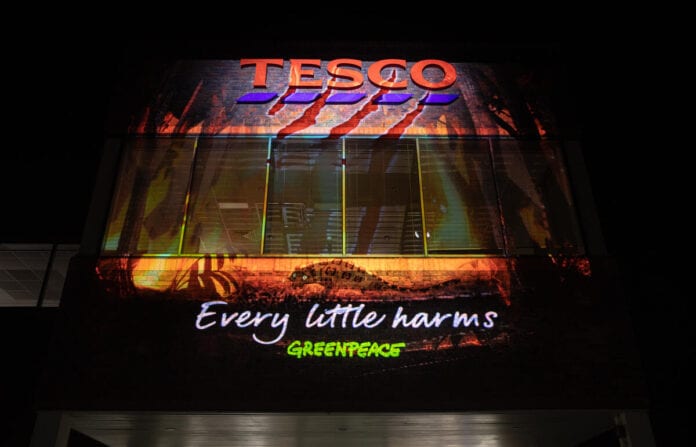Volunteers from Swansea Greenpeace visited Tesco in Swansea on Friday November 27, along with other stores in the Mumbles, Sketty, Uplands and St Helen’s Rd, to reimagine a scene from Greenpeace’s new animation, Monster [1], in which a jaguar turns up in a boy’s kitchen to tell him about the destruction of his forest home for industrial meat production. Greenpeace volunteers took photos with cut-outs of the jaguar and the boy outside Tesco to raise awareness of the supermarket’s part in the destruction of forests like the Amazon. Tesco is driving this destruction by selling more soya-fed meat than any UK supermarket, much of it from companies owned by rainforest destroyers.
Alison Broady from Mount Pleasant said “Threatened wildlife such as jaguars are losing their homes to deforestation, so that’s why we brought these magnificent creatures to Tesco in Swansea today. New Tesco CEO Ken Murphy needs to take urgent action to stop fuelling the destruction of forests like the Amazon. Tesco sells hundreds and thousands of tonnes of industrial meat, much of it produced by companies owned by rainforest-destroyers JBS. Tesco must replace half the meat it sells with plant-based food by 2025 and cut ties with forest destroyers.”
Greenpeace volunteers Alison and Enid Owen also delivered letters to the store managers, from Greenpeace UK Executive Director John Sauven, calling on Tesco’s new CEO Ken Murphy to act now to help drive real change to protect forests, nature and the health of our planet – starting by phasing out industrial meat.
These visits followed on from a tour by Greenpeace UK of a life-size animatronic jaguar to Tesco supermarkets in Essex, Kent, Hertfordshire, and London. The jaguar roared from the roof of what appeared to be a delivery van, surrounded by forest foliage. Flames engulfed Tesco’s strapline on the sides of the van, which had been subverted to read ‘Every Little Harms’.
Devastating fires raged across Brazil this year consuming an area of land the size of the UK in places like the Amazon rainforest, Pantanal wetlands and Cerrado savannah. A major investigation [2] by the Bureau of Investigative Journalism and Greenpeace Unearthed released this week has linked retailers including Tesco, Asda, Lidl, McDonalds and Nando’s to fires on farmland in the Brazilian Cerrado. These habitats are vital for threatened jaguar populations, globally important in the fight against climate change and, ever more crucially, key to keeping new, potentially deadly viruses contained [3].
Tesco, along with other supermarkets, wrote to the Government calling for the law to be strengthened. And yet the supermarket still welcomed it [5], while continuing to buy meat from companies owned by JBS. JBS is the world’s biggest meat packing company, which has been repeatedly linked to deforestation in the Amazon, as well as human rights violations [6].
Alison also said “The elephant in the room that we don’t want to talk about isn’t an elephant, it’s a jaguar – a jaguar whose home has been destroyed for industrial meat production. But just like the little boy in Greenpeace’s Monster video, I do know what to do – I’m going to only eat meat once a week from now on and call on Tesco to play its part and stop selling industrial meat that’s driving the destruction of the homes of indigenous people and wildlife, and contributing to the climate emergency.”
‘Find out why there’s a monster in our kitchens by searching Greenpeace Monster and sign our petition calling on Tesco to cut forest-destroyers from their supply chains [7].’

| [donate]
| Help keep news FREE for our readersSupporting your local community newspaper/online news outlet is crucial now more than ever. If you believe in independent journalism,then consider making a valuable contribution by making a one-time or monthly donation. We operate in rural areas where providing unbiased news can be challenging. |



















